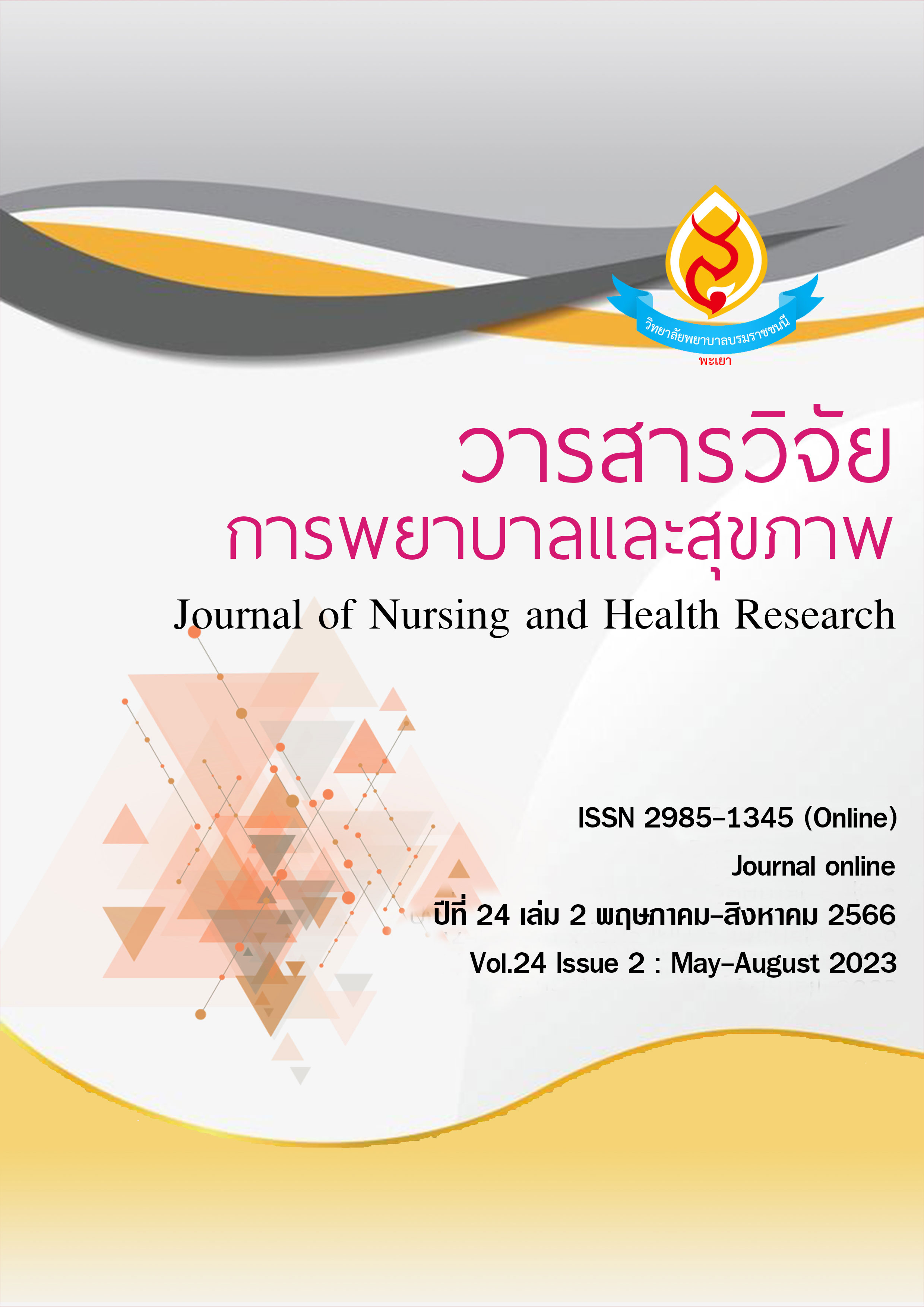พฤติกรรมการรับประทานอาหารของผู้สูงอายุที่มีภาวะสมองเสื่อมในชุมชน และการจัดการของผู้ดูแล
คำสำคัญ:
ภาวะสมองเสื่อม, ผู้สูงอายุ, พฤติกรรมการบริโภคอาหาร, การจัดการผู้ดูแล, ชุมชนบทคัดย่อ
ผู้สูงอายุที่มีภาวะสมองเสื่อมนำมาสู่การเปลี่ยนแปลงพฤติกรรมเกี่ยวกับการบริโภคอาหารไม่เหมาะสม ส่งผลกระทบต่อคุณภาพชีวิตของผู้สูงอายุและความต้องการในการจัดการของผู้ดูแลในครอบครัว การศึกษาเชิงพรรณนา มีวัตถุประสงค์เพื่อศึกษาพฤติกรรมการบริโภคอาหารของผู้สูงอายุที่มีภาวะสมองเสื่อม การจัดการของผู้ดูแลและปัจจัยที่มีความสัมพันธ์กับพฤติกรรมการบริโภคอาหารของผู้สูงอายุที่มีภาวะสมองเสื่อม ในจังหวัดหนึ่งทางภาคตะวันออกเฉียงเหนือ ระหว่างเดือนมิถุนายน พ.ศ. 2564 ถึง มกราคม พ.ศ. 2565 กลุ่มตัวอย่างเป็นผู้ดูแลในครอบครัวและผู้สูงอายุที่มีภาวะสมองเสื่อม จำนวน 117 คู่ เครื่องมือที่ใช้ในการวิจัย ประกอบด้วย แบบสอบถามข้อมูลส่วนบุคคล แบบประเมินพฤติกรรมการรับประทานอาหารของผู้สูงอายุที่มีภาวะสมองเสื่อม โดยมีค่าความเที่ยงระหว่างผู้ประเมินของแบบประเมินพฤติกรรมการรับประทานอาหารของผู้สูงอายุที่มีภาวะสมองเสื่อมเท่ากับ .77 และแบบสอบถามการจัดการพฤติกรรมการรับประทานอาหารของผู้ดูแลผู้สูงอายุที่มีภาวะสมองเสื่อม มีค่าความเชื่อมั่นเท่ากับ .88 วิเคราะห์ข้อมูลด้วยสถิติเชิงพรรณนา และสถิติไคสแควร์ ผลการวิจัย พบว่า พฤติกรรมการรับประทานอาหารของผู้สูงอายุที่มีภาวะสมองเสื่อม ประกอบด้วย 1) พฤติกรรมไม่ยอมไปห้องอาหารโต๊ะอาหารหรือบริเวณที่ใช้รับประทาน 2) ต้องการรับประทานอาหารในช่วงเวลาที่ไม่ใช่มื้ออาหาร และ 3) ไม่เคี้ยวอาหารก่อนกลืน ส่วนด้านการจัดการของผู้ดูแล พบว่า ผู้ดูแลรอให้ผู้สูงอายุมีอาการสงบก่อนแล้วจึงชวนให้รับประทาน และแสดงวิธีการรับประทานอาหารให้ดูเป็นตัวอย่าง และยังพบปัจจัยด้านอายุของผู้ดูแลมีความสัมพันธ์กับพฤติกรรมการบริโภคอาหารของผู้สูงอายุที่มีภาวะสมองเสื่อมอย่างมีนัยสำคัญทางสถิติ (p<.05) ผลการศึกษานี้ควรแนะนำให้ผู้ดูแลได้รับการฝึกทักษะในด้านการดูแลและการจัดการพฤติกรรมการบริโภคอาหารของผู้สูงอายุที่มีภาวะสมองเสื่อมอย่างเหมาะสมโดยคำนึงถึงปัจจัยด้านอายุของผู้ดูแลผู้สูงอายุที่มีภาวะสมองเสื่อมเป็นสำคัญ
เอกสารอ้างอิง
Adulyanukosol, N. (2022). TDJ Dementia in Thailand, Dementia, is Thailand ready?. Retrieved October, 2, 2022, from https://tabsoft.co/2OvbEG5.
Aukner, C., Eide, H. D., & Iversen, P. O. (2013). Nutritional status among older residents with dementia in open versus special care units in municipal nursing homes: an observational study. BMC geriatrics, 13(1). 1-7.
Atsantachai, P. (2017). Common health problems in the elderly and their prevention. Department of Preventive Social Medicine Faculty of Medicine Siriraj Hospital. Bangkok Thailand.
Bernstein, M., & Munoz, N. (2019). Nutrition for the older adult (3th ed.). Burlington: Jones & Bartlett Learning.
Patchara Chotchaisthit. (2019). Nutritional status food consumption in elderly persons with dementia and management of caregivers (Master of Nursing Science Program in Gerontological Nursing). Mahidol University. Thailand.
Crawley, H, & Hocking, E. (2011). Eating well: supporting older people and older people with dementia. UK: Caroline Walker Trust.
Durnbaugh, T. & Roberts, S. (1996). Assessing problem feeding behaviors in mid-stage Alzheimer's disease: clients with mid-stage Alzheimer's disease may be eating far less than their caregivers believe. Geriatric Nursing, 17(2). 63-67.
Ferri, C. P., Prince, M., Brayne, C., Brodaty, H., Fratiglioni, L., Ganguli, M., … Alzheimer's Disease International (2005). Global prevalence of dementia: a Delphi consensus study. Lancet (London, England), 366(9503). 2112–2117. doi: 10.1016/S0140-6736(05)67889-0
Kanin, M. N. M., Tatree, B., & Thanakamon, L. (2020). Nutritional status and associated factors among elderly people in primary care center. GSCARR, 2, 28-35.
Liu, W., Cheon. J. & Thomas, S.A. (2014). Interventions on mealtime difficulties in older adults with dementia: a systematic review. International Journal of Nursing Studies. 51(1). 14-27.
Liu, W., Galik, E., Boltz, M., Nahm, E. S., Lerner, N., & Resnick, B. (2016). Factors associated with eating performance for long-term care residents with moderate-to-severe cognitive impairment. Journal of Advanced Nursing, 72(2), 348–360. doi:10.1111/jan.12846
Lyketsos, C. G., Lopez, O., Jones, B., Fitzpatrick, A. L., Breitner, J., & DeKosky, S. (2002). Prevalence of neuropsychiatric symptoms in dementia and mild cognitive impairment: results from the cardiovascular health study. The Journal of the American Medical Association, 288, 1475–83.
Marino, L. V., Ramos, L. F., & Chiarello, P. G. (2015). Nutritional status according to the stages of Alzheimer's disease. Aging clinical and experimental research, 27(4), 507–513. doi:10.1007/s40520-014-0302-3
Moreno-Cámara, S., Palomino-Moral, P. Á., Moral-Fernández, L., Frías-Osuna, A., Parra-Anguita, L., & Del-Pino-Casado, R. (2019). Perceived needs of the family caregivers of people with dementia in a Mediterranean setting: a qualitative study. International journal of environmental research and public health, 16(6), 993. doi:10.3390/ijerph16060993
Nasok, W. & Panomai, P. (2019). Food consumption behavior and factors affecting nutritional status of elderly in Muang district, Loei province. Research and Development Journal, Loei Rajabhat University, 1494-105.
Ramage-Morin, P. L., Gilmour, H., & Rotermann, M. (2017). Nutritional risk, hospitalization and mortality among community-dwelling Canadians aged 65 or older. Health Reports, 28(9), 17–27.
Ross, G. W., & Bowen, J. D. (2002). The diagnosis and differential diagnosis of dementia. The Medical Clinics of North America, 86(3), 455-476. doi:10.1016/s0025-7125(02)00009-3
Ruangsinpinya, P. & Muangphaisan, W. (2018). Prevention of dementia. In Challenges and Solutions for Healthy Aging: Printmaking Co., Ltd. Nonthaburi.161-170.
Siwichian, T. (2016). A study of the nutritional status and the factors relating to malnutrition status of the elderly receiving health service from pompet community medical center. Journal of Preventive Medicine Association of Thailand, 6, 119-130.
Wahl, D., Solon-Biet, S. M., Cogger, V. C., Fontana, L., Simpson, S. J., Le Contour, D. G., … Ribeiro, R. V. (2019). Aging, lifestyle, and dementia. Neurobiology of Disease, 130, e104481.
World Health Organization. (2020). Dementia. Retrieved December 1, 2020, from https://bit.ly/2JA83nx.
Yannakouli, M., Mamalakia, E., Anastasioua, C.A., Mourtzi, N., Lambrinoudaki, I., & Scarmeas, N. (2018). Eating habits and behaviors of older people: Where are we now and where should we go? Maturitas, 114, 14-21.
ดาวน์โหลด
เผยแพร่แล้ว
เวอร์ชัน
- 09.11.2023 (2)
- 31.08.2023 (1)
รูปแบบการอ้างอิง
ฉบับ
ประเภทบทความ
สัญญาอนุญาต
ลิขสิทธิ์ (c) 2023 วารสารวิจัยการพยาบาลและสุขภาพ

อนุญาตภายใต้เงื่อนไข Creative Commons Attribution-NonCommercial-NoDerivatives 4.0 International License.



